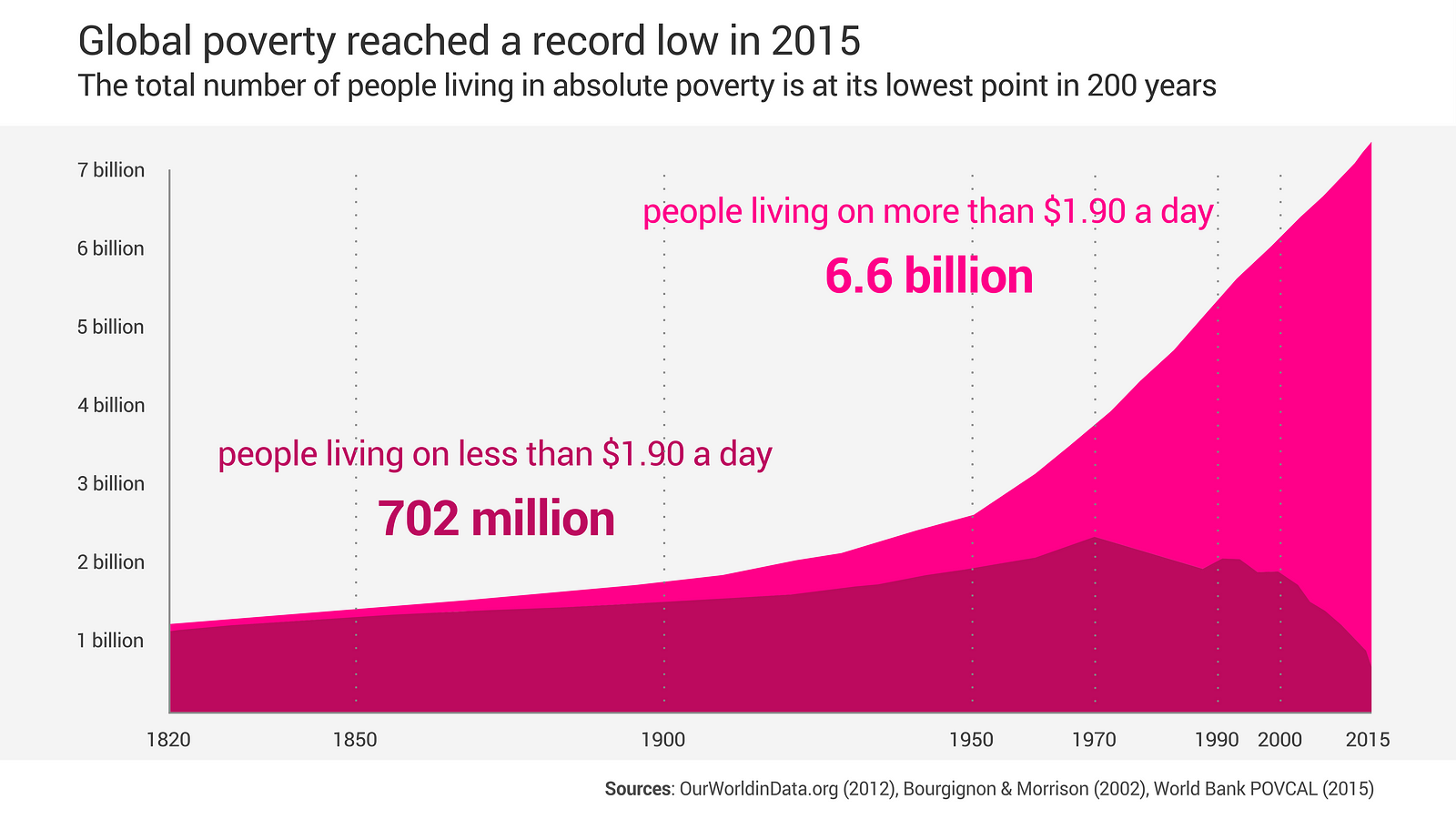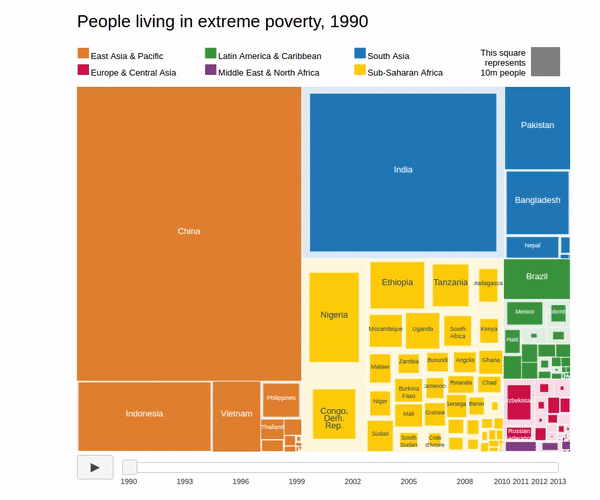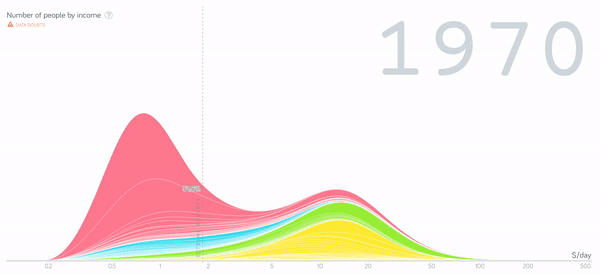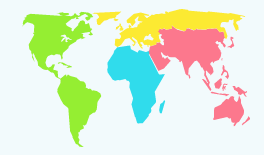https://medium.com/future-crunch/global-inequality-is-getting-better-fdbfde215b73
O mundo nunca teve TÃO POUCOS POBRES nos últimos 200 anos, e o ritmo de redução da pobreza absoluta tem sido avassalador desde a queda do muro de Berlim, que significou, simbolicamente, o fim do socialismo e a retomada da globalização, o que significa que a economia de mercado foi, SIM, eficiente para reduzir a miséria absoluta, eliminar muitos bolsões de pobreza, e colocar muita gente, milhões de pessoas, numa classe média baixa plenamente aceitável para os padrões seculares de pobreza disseminada. Muito disso se deve à China e um pouco menos à Índia, mas outros países, em outras regiões, também experimentaram redução nos níveis de pobreza absoluta. Hoje em dia não é incomum achar um catador de rua, um mendigo, típico em todas as cidades do chamado "mundo em desenvolvimento", com o seu celular, se comunicando com familiares ou conhecidos. Mesmo rurais afastados conseguem ter celular. Isso é economia de mercado.
Enganam-se redondamente, estupidamente, todos os antiglobalizadores, também chamados de altermundialistas, que se mobilizam contra a economia de mercado, contra o capitalismo. São uns idiotas. E enganam-se quadradamente todos aqueles economistas à la Piketty que acham que o principal problema do mundo é a desigualdade, e que esta deve ser reduzida. Bobagem. O principal problema do mundo ainda é a pobreza, e todos os economistas deveriam estar mobilizados em acabar com a pobreza, não em reduzir o número de ricos e o seu patrimônio. Deveriam estar ocupados em convencer os políticos que eles devem reduzir a pobreza, não em produzir igualdade.
Paulo Roberto de Almeida
Brasília, 15/07/2017
The Decline of Poverty
Your opinions about global inequality really depend on where you’re standing
If you’re over the age of 18, you probably grew up with the story of how the world is divided into the rich and the poor.
That story was forged during a time of real global inequality. In 1970, around 60% of the world’s 3.7 billion people lived in extreme poverty. If you plotted the world’s income on a distribution curve, it looked like camel humps. There was a small, high income group of countries up at the front, and then a bigger low income group at the back.
For decades the language that we created to describe this world (First vs. Third, developed vs. developing) dominated popular discourse, which is why it’s so deeply ingrained for so many of us.
Which is a pity, because that world doesn’t exist any more.
If you’re willing to re-examine some of your old fashioned ideas, you’ll be pleasantly surprised to learn that the story has changed.
Today, only 0.7 billion of the world’s 7.5 billion people live below the extreme poverty line. That’s less than 10% of the world’s population. Not only is this the lowest proportion of people in extreme poverty ever, it’s also the lowest total number in more than 200 years.
It’s the great economic success story of all time. To paraphrase the indespensible Max Roser, the front page headline every day should read:
Since yesterday, 250,000 people have been lifted out of bone-crushing, one-meal-a-day, soul-destroying, no-dentist, no-doctor, no-electricity, single accident-means-life-and-death, unrelenting, extreme poverty.
It’s worth diving into this in a bit more detail.
For most of recorded history, only a tiny elite enjoyed higher standards of living. By far the majority of people were dirt poor. That’s how things stayed. Inequality wasn’t a social issue, it was just the way the world worked. In the last 200 years this has changed dramatically.
Poverty has been falling continuously despite the world’s population increasing seven fold during that time. And since the fall of the Berlin Wall, that process has accelerated, with an average of 47 million people lifted over the extreme poverty line every year for the last 25 years.
A lot of this is thanks to China. Between 1978 and 2010, the country’s economy grew at an average pace of 10% per year, lifting an astonishing 800 million people out of extreme poverty. And since 2010 inequality in China has been falling too, thanks to minimum-wage regulations and increases in the social welfare state.
It’s not just China though. Poverty reduction has happened in every region of the world. In 1981 almost one third of the non-Chinese world population was living in extreme poverty. By 2013, this share had fallen to 12%.
The amount of money that would be theoretically needed to lift everyone in the world out of extreme poverty is now about half of what it was a decade ago. This shows that not only are we reducing the incidence of poverty, we’re making inroads into its intensity. And it’s happening at every income level. The income cutoff of the world’s poorest 10% has doubled in the last decade, and so has the global median income (from $1,100 a year to $2,010 a year).
That means that the world today looks very different to the one that many of us still have in our heads. The double camel hump from the 1970s has disappeared, to be replaced by something that now looks a lot more like a normal distribution curve. Everyone who makes it past the vertical poverty line you see below can now afford a bicycle, basic healthcare and a mobile phone.
The lives of the bottom billion are steadily improving and the world’s big aid agencies are now saying that they think we might see the end of extreme poverty within our lifetimes.
So the next time you read an article lamenting that inequality is the greatest economic issue of our time, take a moment and ask yourself who’s writing it. Your opinion really depends on who you care about, and where you stand.
If you’re a car worker in Guangzhou you probably feel a lot better about the state of the world than if you’re a car worker in Adelaide. If you’re a journalist in New York whose previously stable, middle class income is now a lot less certain, you’re a lot more likely to write articles about inequality. But if you’re a tech journalist in Kenya reporting on Nairobi’s amazing boom, the subject is less likely to appear.
It’s true that globalisation has been unkind to many people, especially in places like the United Kingdom and the United States. These countries have been eating their poor for decades, and the political consequences have become very apparent in the last few years. But we are talking about a very small proportion of the world’s total population. How many column inches have been dedicated to the livelihoods of a few thousand coal miners in the US, compared to the few hundred million people in Latin America, almost all of whom live in countries where inequality has dropped in the last decade?
At the risk of sounding callous... if the fate of your fellow global citizens concerns you more than the fate of the working class in a few OECD countries, you should be feeling pretty happy about what humanity has achieved in the last 25 years.
We should continue to highlight the plight of those who are still living in extreme poverty. And we should continue to insist that our political leaders enact policies that reduce inequality within our own countries. But we also need to acknowledge our global victories, and celebrate success.
For the average human being on the planet today, the world has never been a better place. That story doesn’t get told nearly enough.

Future Crunch fosters intelligent, optimistic thinking for the future. We help people understand what’s on the frontiers of science, technology and human progress, and what it means for humanity





